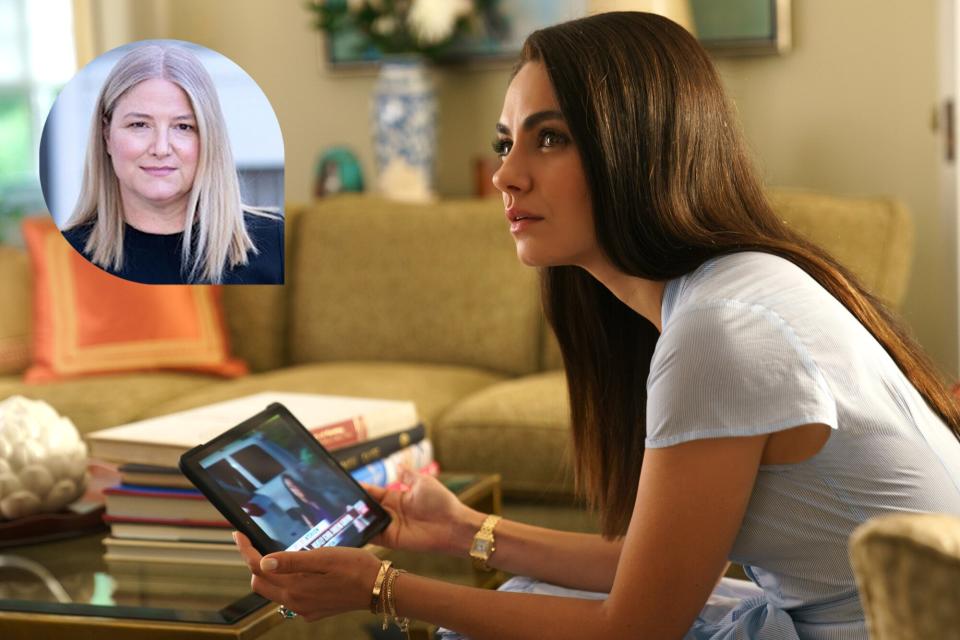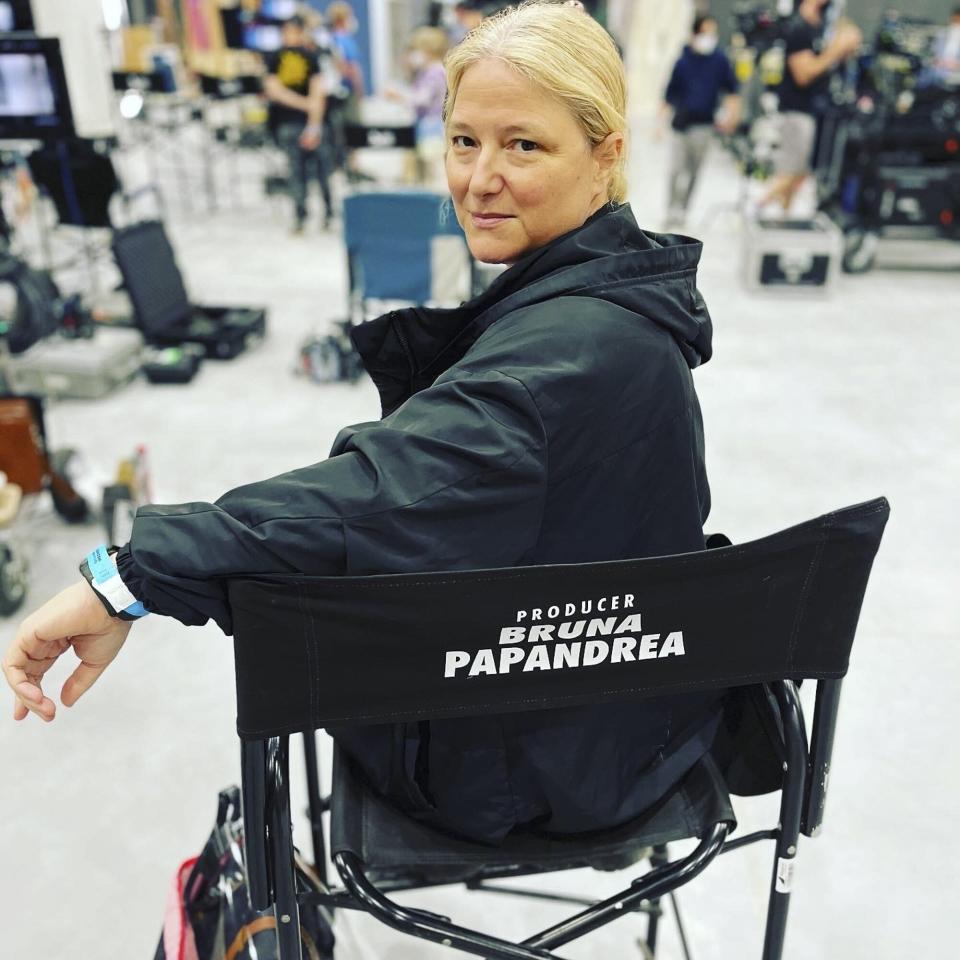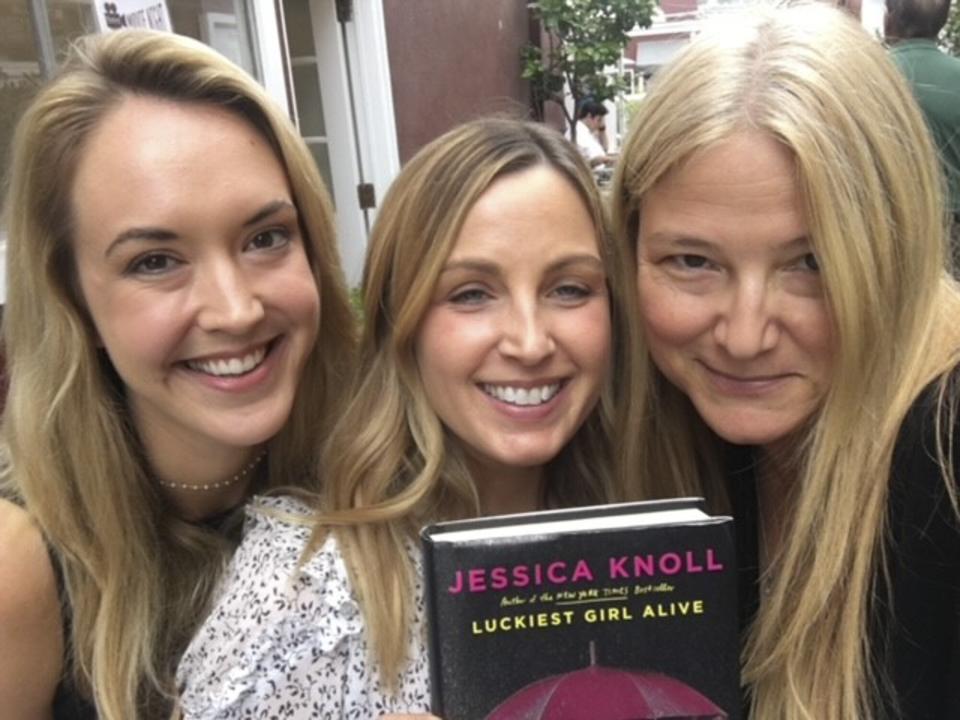Luckiest Girl Alive 's Bruna Papandrea is a 'warrior' devoted to elevating new voices in Hollywood

- Oops!Something went wrong.Please try again later.
EW Game Changers is a series profiling the people and projects making an impact in diversity, equity, and inclusion in entertainment.
Bruna Papandrea has produced film and TV for over two decades — Gone Girl, Wild and Big Little Lies are just a few of her high-profile projects — but she's proudest of Luckiest Girl Alive, which came out on Netflix last week.
As a producer on the film adaptation of Jessica Knoll's dark, twisted 2015 novel, Papandrea worked to bring the powerful story from page to screen for almost eight years. And despite the long journey, she never gave up because she knew the story and the character (played by Mila Kunis) needed to be seen by audiences everywhere. "Honestly, the project I'm most proud of is Luckiest Girl Alive because it is completely unique in terms of the tone and the themes we were balancing," Papandrea, 51, tells EW. "It's about how this woman has turned herself into someone else to survive a trauma."

Sabrina Lantos/Netflix; Inset: Courtesy of Bruna Papandrea
The story centers on successful, twentysomething Ani Fanelli (Kunis) who is struggling to keep her past trauma buried, and it's partially based on author Knoll's own experiences. Papandrea knows the subject matter — gang rape and school shootings, among others — may be hard for some to watch, but that's exactly why she wants everyone to see it; she hopes it will spur difficult, necessary conversations. "Everyone was so sensitive to all of it because that stuff is really hard to film and it's really hard to get right," she says. "That was the most important thing, doing it authentically. We consulted with RAINN, we consulted with [people from] Sandy Hook, we consulted with Respect Ability. And I'm just really proud that this core team stuck together and that it was a really harmonious, safe, wonderful experience. And hopefully [a lot of people are] going to see it because it's Netflix." (The film debuted in Netflix's Top 10 in 91 countries, with over 43.08 million hours viewed in its opening weekend.)
Papandrea is passionate about producing female-driven stories that center on characters and voices that need to be elevated. "Getting to work on Big Little Lies with an ensemble of women, not just in one great role but five female main roles, that to me is just so invigorating," she says. "But you don't always get it right, and I think you learn as much from the things that don't work as the things that do, but I'd rather take the risk and fail. I'm not scared to fail."
But she didn't always have such a clear vision for her life and work. In fact, Papandrea had no idea producing projects about diverse female voices would eventually become her path — she actually always thought she'd become an actor. "I got rejected from three of the best drama schools in Australia," she says with a laugh. "And then I wanted to be a writer, but I wasn't good at that either, so I became a producer because I feel like all my interests convened in this one spot where I did feel like I was, even from a young age, kind of a champion. I was a very passionate young person, I loved telling stories, I loved the theater, I loved movies, I loved books. So I was like, maybe this is the job for me. And what quickly became apparent to me was my skills in how I can help other people do that too."
When she was 14, she read Margaret Atwood's The Handmaid's Tale for the first time and it blew her mind to visualize a dystopian world through the eyes of a young woman. She also was very inspired by Australian filmmaker Jane Campion. "I didn't realize how big a problem it was getting females behind the camera because I feel like I grew up with all these amazing female filmmakers in my orbit as a young woman. I soon learned the gender gap is bad everywhere, but what inspired me when I was younger was those authors and those female filmmakers."

Courtesy of Bruna Papandrea
She decided to follow in their footsteps by finding great books created by and about women to adapt into movies and TV shows. "At the point Reese [Witherspoon] and I teamed up [to create the production company Pacific Standard], we both were really feeling there was an enormous deficit of female stories, full stop. And women at the center, and even women in supporting roles," she says. "And it's just become more focused as my career has progressed."
The pair collaborated on Gone Girl, Wild and Big Little Lies before ending their partnership in 2016. The following year, Papandrea founded Made Up Stories, a development and production company that amplifies new voices to tell stories about the diversity of the human experience. She's committed to hiring females both on- and off-screen as well as elevating voices that have historically gone ignored in the industry.
"It's still really hard to sell things that feel unfamiliar to people," she says. "Whether that's a diverse lead, whether that's people with disabilities, whether that's how we look at gender, because they all want something to compare it to. I believe, if they let us make it, those audiences will be built and then there'll be an appetite for more. So even though we've been very fortunate to get a lot made, there are still these massive gaps where it feels like we're starting again every time. If I could wave my magic wand, I'd just make it and I'd say, I promise you the audiences will come. I just have so much admiration for people that create any work that feels new and original and reflects the world we live in."
Papandrea says she's in "warrior mode" when it comes to making sure new voices are represented in every story she tells. "Stories have the power to change. If I didn't believe that, I don't think I'd be doing this job, right?" she says. "We can move the needle in some small way by telling stories, so how can we change minds and hearts? I believe you can deal with complex subject matter while also entertaining people and making them think. We must make sure these new voices break through. I can't just be giving them more of the same."
Most importantly, she's not scared to "risk it all" when it comes to fighting for what she believes in. "If I do lose it all, I would be like, okay, I'll rebuild it," she says. "I think that's why I was alright when the pandemic hit because I'm a bit of a survivor. I just went, okay, what's next? How do I protect my children? But the biggest thing I thought about was how do I keep this group of people employed that have devoted themselves to our company? How do I help the crew members that actually can't work? I thought a lot about that during the pandemic and that's the thing that kind of buoyed me and kept me really focused on just plowing ahead."

Courtesy of Bruna Papandrea
That's how focusing on below-the-line crew roles became a new passion for her. "They work the hardest, they work the longest, they make everything happen. They're the true unsung heroes — the gaffers, our grips, craft service, video assist, design, art department," she says. "And they literally couldn't work. I mean, I could still develop things, I was lucky I could shoot things in Australia. I had a backup. But it was the crews that could not work, and a lot of people are living week-to-week. So we started an initiative right at the beginning of COVID called It Takes Our Village, and I did it with a few other producers and showrunners. We raised a million dollars in days for crews."
She also got involved with ReFrame, a non-profit that focuses on promoting gender parity in the industry, Papandrea and realized that there is still so much that needs to be done. "Obviously a lot of people are talking about getting more females as directors, but beyond that, what I'm really proud of is when we give a woman who's been an art director her first production design film, for instance," she says. "We've done that multiple times, then they go off and become superstars because, of course, they're brilliant. That to me is an area that still needs an enormous amount of focus, the technical positions — more women in the electrics' department, literally behind the camera, in the camera department. How can we elevate women below the line as well?"
She also wants to do whatever she can to make this industry more accessible to anyone who has ever dreamed about making movies and TV shows. "I came from a really low socioeconomic background and by some miracle I found my way to Hollywood, and I think still the biggest obstacle for women and men from low socioeconomic circumstances is the access," she says. She knows what it's like to have to work twice as hard to get the same opportunities as other people after growing up raised by a single mother on welfare, and she didn't want to perpetuate a problematic cycle of giving opportunities only to people coming from privilege.
"I remember at one point when I would get resumes, everyone had been to an Ivy League school and I was like, where are the people like me who didn't finish college, who really want to be in our business, who are smart, who are emotionally intelligent, who have drive, who would do anything? I've thought a lot about the last few years and we as a company have tried to go the extra mile to find and seek out those people, particularly entry-level positions, to give them their first thing on their resume. There's always something you can do [to improve this industry], so why not do it?"
Sign up for Entertainment Weekly's free daily newsletter to get breaking TV news, exclusive first looks, recaps, reviews, interviews with your favorite stars, and more.
Related content:

